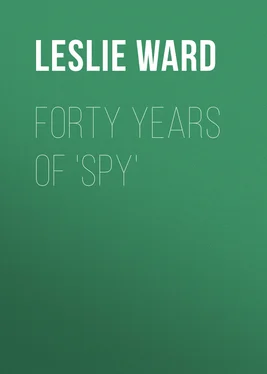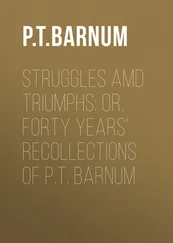Leslie Ward - Forty Years of 'Spy'
Здесь есть возможность читать онлайн «Leslie Ward - Forty Years of 'Spy'» — ознакомительный отрывок электронной книги совершенно бесплатно, а после прочтения отрывка купить полную версию. В некоторых случаях можно слушать аудио, скачать через торрент в формате fb2 и присутствует краткое содержание. Издательство: Иностранный паблик, Жанр: foreign_prose, foreign_home, visual_arts, на английском языке. Описание произведения, (предисловие) а так же отзывы посетителей доступны на портале библиотеки ЛибКат.
- Название:Forty Years of 'Spy'
- Автор:
- Издательство:Иностранный паблик
- Жанр:
- Год:неизвестен
- ISBN:нет данных
- Рейтинг книги:4 / 5. Голосов: 1
-
Избранное:Добавить в избранное
- Отзывы:
-
Ваша оценка:
- 80
- 1
- 2
- 3
- 4
- 5
Forty Years of 'Spy': краткое содержание, описание и аннотация
Предлагаем к чтению аннотацию, описание, краткое содержание или предисловие (зависит от того, что написал сам автор книги «Forty Years of 'Spy'»). Если вы не нашли необходимую информацию о книге — напишите в комментариях, мы постараемся отыскать её.
Forty Years of 'Spy' — читать онлайн ознакомительный отрывок
Ниже представлен текст книги, разбитый по страницам. Система сохранения места последней прочитанной страницы, позволяет с удобством читать онлайн бесплатно книгу «Forty Years of 'Spy'», без необходимости каждый раз заново искать на чём Вы остановились. Поставьте закладку, и сможете в любой момент перейти на страницу, на которой закончили чтение.
Интервал:
Закладка:
Most of the well-known artists of the day visited my parents, and amongst them I remember Sydney Cooper, David Roberts, C. R. Leslie, Peter Graham, Stanfield, Edward Cooke, Frith, Millais, etc., etc. Stephens, the art critic of the "Athenæum," came with his intimate friend, Holman Hunt; he assisted the famous pre-Raphaelite in painting in the detail in some of his pictures, such as the Moorish temple in "The Saviour in the Temple." Later, he wrote the catalogue of "Prints and Drawings" at the British Museum. The last time I met Mr. Stephens, he told me the greatest pleasure he could possibly have was to go round London with my father, for there was not a place of interest of which he could not tell some anecdote of historical or topical information; and as an antiquary of some merit, the art critic was evidently in a position to give his appreciation with the authority of knowledge.
I think my father's closest friend was John Doran. To quote Mr. Edge:—" … Doctor Doran, known as the 'Doctor,' having graduated in Germany as a 'Doctor of Philosophy.' He was a delightful raconteur, a brilliant conversationalist, a man to put the shyest at his ease. He, too, studied history and wrote some of the most delightful biographies in the English language. The painter (my father) and the Doctor took many an excursion together to old-world places celebrated for memories quaint, tragic or humorous, and their rambles were perpetuated in their pictures and books."
Doran began his literary career by producing a melodrama at the Surrey Theatre when he was only fifteen years of age, and continued up to his death to produce a series of interesting works, although he did not write for the stage after his early success. He was editor of Notes and Queries and the author of "Table Traits and Something on Them." Perhaps his best-known work was "Her Majesty's Servants." Among his later works, "Monarchs Retired from Business," and "The History of Court Fools" occur to my mind simultaneously.
The three following anecdotes from Dr. Doran's journal, will appeal on the strength of their own dry humour and at the same time give the reader a glimpse of the character of my father's Irish friend:—
October 18th, 1833. In an antiquated edition of Burnet's "History of His Own Times" it was stated that an old Earl of Eglinton had behaved so scandalously that he was made to sit in the "Cutty Stool" (or stool of repentance at kirk) for three Sabbaths running. On the fourth Sunday he sat there again, so the minister called him down as his penance was over. "It may be so," said the Earl, "but I shall always sit here for the future … it is the best seat in the kirk, and I do not see a better man to take it from me."
December 9th, 1833. Colonel Boldero told us after dinner a good story of Luttrell that Rogers told him the other day. He was about to sit for his picture, and asked Luttrell's advice as to how he should be taken. "Oh," said Luttrell, "let it be as when you are entering a pew—with your face in your hat."
December 5, 1833. Heard also at dinner a story of "Poodle" Byng. Dining once at the Duke of Rutland's, he exclaimed on seeing fish on the table, "Ah! My old friend haddock! I haven't seen that fish at a gentleman's table since I was a boy!" The "Poodle" was never invited to Belvoir again.
Mr. and Mrs. S. C. Hall, also well-known writers of the day, were constant visitors at our house. S. C. Hall was said to have suggested the character of Pecksniff to Dickens, perhaps because he interlarded his conversation with pious remarks, which may have sounded singularly hypocritical to many people. As a child I regarded him with terror, because whenever he called he would come to our nursery and behave in a manner he probably thought highly entertaining to children, which consisted of pulling awful faces. His mass of white hair, bushy eyebrows and staring eyes gave him an ogreish look, and added to my fears when he shook his fist at me in mock horror. Then he would tickle me as hard as he could; and as I hated this form of play, his exertions only moved me to tears, so that when I heard him coming I invariably hid myself until his departure.
Mr. Hall began life as a barrister and turned to literary work, establishing the Art Journal , and carrying it on in the face of very discouraging circumstances. Eventually he was successful, and his work had an extensive influence, I suppose, on the progress of British art. As a writer his output was enormous; he and his wife published between them no fewer than two hundred and seventy volumes. As an ardent spiritualist he was very interested at that time in a medium who, I am afraid, was an atrocious humbug. One Good Friday my father called, to find Mr. Hall in a state of great excitement.
"You've just missed dear Daniel," said Hall. "He floated in through the window, round the house and out again, and I don't doubt we shall see the day when he will float round St. Paul's."
Mrs. S. C. Hall (very Irish), who had a great personal reputation as a writer, was most attractive and altogether a very interesting woman, being a spiritualist and a philanthropist. She founded the Hospital for Consumptives in the Fulham Road, and persuaded her great friend Jenny Lind to sing at charity concerts to gain funds for her institution. My father painted both of them, and the portrait of Mr. Hall is now in the possession of the latter's family.
Ruskin was on very friendly terms with them, and it was the Halls who introduced us to the Virtues, who were the proprietors and publishers of the Art Journal . James Virtue, who was a fine oar and President of the London Rowing Club, was one of the most cheerful men one could wish to meet; and as hostess, his wife, who, I am happy to say, is still living, was equally delightful. His brother William Virtue afterwards saved my life—but that is anticipating events somewhat.
Mr. and Mrs. Tom Taylor were another interesting and talented couple who were friends of my parents. Tom Taylor was the art critic of the Times , and at one time editor of Punch . He was also the author of several popular plays, of which Still Waters Run Deep and the Ticket of Leave Man , in which Henry Neville played the hero, are perhaps the most widely known. In conjunction with Charles Reade he wrote some amusing comedies; as well as writing in prose and verse for Punch he compiled some interesting biographies, of Reynolds, Constable, David Cox, and C. R. Leslie, R.A. At dinner his appearance was remarkable, for he usually wore a black velvet evening suit. A curious trait of the dramatist's was his absent-minded manner and forgetfulness of convention. Sometimes when walking in the street with a friend he would grow interested, and, to emphasise his remarks, turned to look more directly into the face of his companion, at the same time placing his arm around his waist. In the case of a lady this habit sometimes proved rather embarrassing!
Mr. Tom Taylor was a man of unbounded kindness in helping everybody who was in need of money or in trouble; his generosity probably made him the object of attentions from all sorts and conditions of people, a fact very soon discovered by his domestics, for one day Mr. and Mrs. Taylor returned from a walk to be met by a startled parlourmaid who announced the presence of a strange-looking man who was waiting to see them. Her suspicions being aroused by his wild appearance, she had shown him into the pantry, fearing to leave him in the drawing-room. On repairing to the pantry with curiosity not unmixed with wonder, they discovered … Tennyson … quite at home and immensely tickled by his situation.
Mrs. Tom Taylor was descended from Wycliffe, and in her early youth lived with her two sisters with their father, the Rev. Mr. Barker (who was quite a personality), in the country. Laura Barker was brought up in circumstances very similar to the Brontës. She was extremely talented, and began her musical career at the age of thirteen, when her great musical gifts brought her to the notice of Paganini. Paganini, after hearing her play, was much astonished at her power in rendering—entirely from ear—his wonderful harmonies upon her violin. General Perronet Thompson, on another occasion, was so pleased with her performance that he encouraged her talent by presenting her with a "Stradivarius." Later she became an art critic in Florence, and the composer of many popular songs. When she married Mr. Tom Taylor she continued to publish her talented songs under her maiden name.
Читать дальшеИнтервал:
Закладка:
Похожие книги на «Forty Years of 'Spy'»
Представляем Вашему вниманию похожие книги на «Forty Years of 'Spy'» списком для выбора. Мы отобрали схожую по названию и смыслу литературу в надежде предоставить читателям больше вариантов отыскать новые, интересные, ещё непрочитанные произведения.
Обсуждение, отзывы о книге «Forty Years of 'Spy'» и просто собственные мнения читателей. Оставьте ваши комментарии, напишите, что Вы думаете о произведении, его смысле или главных героях. Укажите что конкретно понравилось, а что нет, и почему Вы так считаете.












